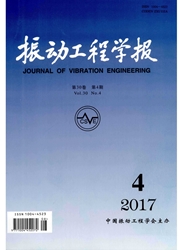

 中文摘要:
中文摘要:
传统振动噪声主动控制系统在灵活性、通用性和稳定性等方面存在缺陷,难以适应外界环境的动态性和不确定性。由此考虑将多智能体技术与经典的控制理论—自适应前馈FxLMS控制算法综合起来形成有效智能控制系统。根据主导振动噪声的结构模态分解振动噪声控制问题,比较结构特征频率声压和一预设阈值大小来定义控制器操作域。综合各种功能函数和自适应FxLMS算法形成控制单元(控制器智能体)。通过最大声压频率和特征频率之差小于某一常数α来定义决策函数,以决策各控制单元的优先启动。提取传递函数至上层组织作为加权系数以实现各控制单元之间的合作。通过调整常数α能够实现不同控制器的灵活启动,并利用智能体之间的合作实现系统的通用性和稳定性。
 英文摘要:
英文摘要:
The traditional active noise control system has such defects as lessing flexibility, universality and stability, which is difficult to adapt to the dynamic and uncertainty of the environment. Thus, the multi-agent technology and the classical control theory and the adaptive feedforward FxLMS control algorithm are combined to form an effective intelligent control system. The noise control problem is decomposed according to the structural modes of the dominant noise. The controller operating domain is defined by comparing the sound pressure at the characteristic frequency (corresponding to the structural mode)with a preset threshold value. The control unit (controller agent)is formed by integrating a series of functions and the adaptive FxLMS algo- rithm. The decision function is defined by the difference between the maximum sound pressure frequency and the characteristic frequency. Whether the control unit starts up depends on the decision function. The transfer functions are extracted as weighting factors to achieve the cooperation between the control units. By adjusting the constant a of the decision function, the flexible startup of different controllers can be realized. The versatility and stability of the system are realized through the cooperation among agents.
 同期刊论文项目
同期刊论文项目
 同项目期刊论文
同项目期刊论文
 Active control of sound radiation and transmission into a cavity consisting of multi-flexible plates
Active control of sound radiation and transmission into a cavity consisting of multi-flexible plates 期刊信息
期刊信息
